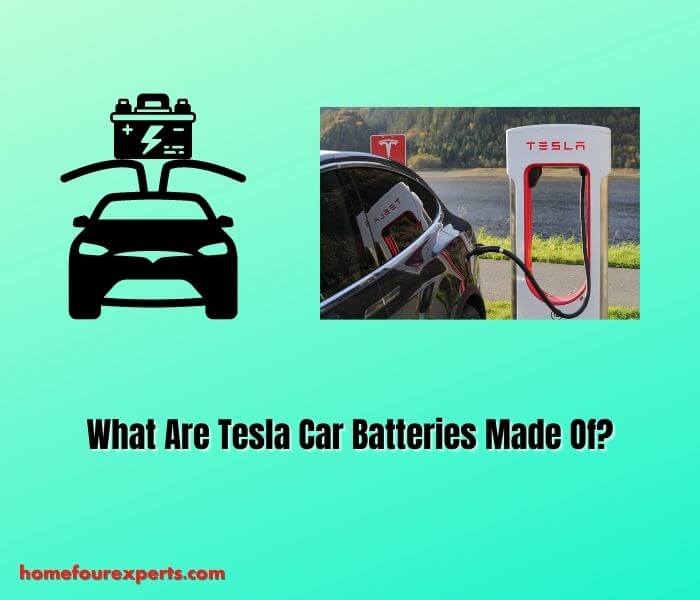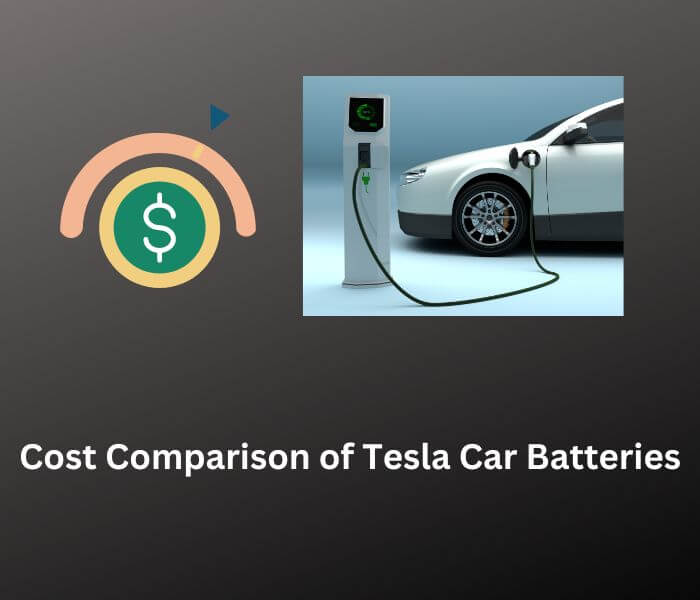Welcome to our blog, where we discuss the fascinating technology behind Tesla car batteries. Tesla cars are known for their impressive performance and clean energy efficiency, but what is the science behind the battery that powers these vehicles? In this blog, we’ll explore the materials used to construct Tesla car batteries, and how these components work together to create a powerful and reliable source of energy. So, buckle up and let’s learn more about what makes Tesla car batteries tick!

Components of Tesla Car Batteries
Tesla car batteries are a key component of what makes Tesla cars so advanced and efficient. They are made up of several different components including lithium-ion cells, cooling systems, a battery management system, and a power electronics module.
The lithium-ion cells are responsible for storing energy and providing the power to move the vehicle. Cooling systems are necessary to keep the battery from overheating, while the battery management system monitors the cell’s performance and temperature.
Finally, the power electronics module works to regulate the voltage and current for the most efficient operation of the battery. All of these components work together to make Tesla cars a reliable and safe way to get around.
Lithium-Ion Battery Cells
Tesla cars are powered by lithium-ion battery cells, which are an advanced type of rechargeable battery technology. These battery cells use a combination of lithium and other materials, such as cobalt, aluminum, and nickel, to store and release energy.
Lithium-ion batteries are lightweight, powerful, and efficient, making them the perfect choice for powering electric cars. The chemistry of these battery cells allows them to hold a large amount of energy in a small package, making them an ideal choice for powering the Tesla fleet of electric vehicles.
Tesla has invested heavily in their own battery technology, which has enabled them to push the boundaries of electric car performance.
Battery Management Systems
Tesla car batteries are made from a variety of different materials, including lithium-ion cells, aluminum, copper, and steel. Each component of the battery serves an important purpose in the overall operation of the system.
The lithium-ion cells are the main source of energy for the battery, providing the necessary power for the car. Aluminum and copper act as conductors, transferring electricity from the cells to the car.
The steel helps to house and protect the battery, as well as providing structural support. All of these materials work together to form a powerful and reliable battery, allowing Tesla cars to travel up to hundreds of miles on a single charge.
Cooling System
Tesla car batteries are made from a mix of materials, including lithium-ion cells, aluminum, steel, and a variety of other alloys. The lithium-ion cells provide the power for the vehicle, while the aluminum and steel act as the supporting frame.
The alloys provide additional strength and stability to the battery, allowing it to better handle the heat generated during charging and discharging. Additionally, the alloys help to protect the battery from the vibrations and impacts associated with driving the car.
All of these materials combine to create a powerful and reliable power source for your Tesla car.
Charging Technology
Tesla cars are powered by some of the most advanced and sophisticated battery technology available today. Their batteries are made from a combination of lithium-ion cells and nickel-cobalt-aluminum (NCA) cells.
The lithium-ion cells provide the power for the car and are rechargeable, while the nickel-cobalt-aluminum cells are used to increase the capacity and stability of the battery. The combination of these two types of cells results in Tesla’s powerful and reliable batteries, which are essential for powering the cars.
Tesla batteries are also designed with safety in mind, using the latest cooling technologies and safety systems to ensure the battery is always performing at its best. With its cutting-edge technology, Tesla batteries are the perfect choice for eco-friendly, high-performance driving.
Benefits of Tesla Car Batteries
Tesla car batteries are made of lithium-ion cells that are designed to provide improved performance and superior energy efficiency. The lithium-ion cells are composed of a positive electrode, a negative electrode, and an electrolyte.
The positive electrode is composed of a lithium-containing compound, such as lithium-cobalt oxide, while the negative electrode is composed of a carbon material. The electrolyte is a lithium salt solution.
The combination of these components is what makes up the Tesla car battery. The benefits of Tesla car batteries are numerous. They are lightweight, making them ideal for electric vehicles, and also provide superior energy efficiency and range. Additionally, Tesla car batteries are designed to last longer than traditional lead-acid batteries, allowing electric vehicle owners to make fewer trips to the gas station. Finally, Tesla car batteries are designed to be more eco-friendly, as they contain no hazardous materials and are 100% recyclable.
Longer Range
Tesla cars are powered by state-of-the-art lithium-ion batteries. These batteries are made up of several components, including lithium, cobalt, nickel, aluminum, and other materials.
Lithium and cobalt are the most important components, as they make the battery cells more efficient and increase the battery’s capacity. Nickel and aluminum help to make the cells more durable and resilient, while other materials are used to control the temperature and ensure safety.
Together, these components make up the power source for Tesla cars, giving them the energy to travel long distances and provide reliable performance.
Fast Charging
Tesla cars are renowned for their impressive battery technology, but you may be wondering what these batteries are actually made of. At the heart of a Tesla car battery is a collection of lithium-ion cells that are designed to last for up to 1 million miles.
The cells are encased in a hard shell that helps protect them from the elements and are combined with cooling systems and other components to ensure optimal performance. These components are combined with a specialized battery management system that helps maintain the battery’s health and charge level, as well as its longevity.
Additionally, Tesla uses a proprietary battery chemistry that helps its batteries hold their charge for longer and recharge faster. All of these components make Tesla car batteries some of the most advanced and reliable automotive batteries on the market today.
Lower Maintenance
Tesla car batteries are a fascinating piece of technology that has revolutionized the automotive industry. They are made up of a combination of lithium-ion cells, which are the most efficient and long-lasting type of rechargeable battery available today.
These cells are encased in a strong, lightweight metal casing and are designed to store energy for extended periods of time with minimal degradation. With their high power output and low maintenance requirements, Tesla car batteries are a great choice for those looking for long-term reliability and low-maintenance operation.
Environmental Impact of Tesla Car Batteries
Tesla car batteries are made up of lithium-ion cells, one of the most efficient and environmentally friendly energy storage options available. Lithium-ion batteries are made from materials like cobalt, nickel, manganese, and aluminum—all of which are harvested from the earth in a responsible and sustainable way.
Tesla car batteries are designed to stay charged for long periods of time, resulting in less energy wasted and a smaller environmental impact. Additionally, Tesla’s recycling program ensures that any used or damaged batteries are properly disposed of in a way that minimizes the negative environmental impacts of the battery production process.
Rechargeable Battery Technology
Tesla car batteries are made of a unique combination of materials that make them one of the most powerful and efficient rechargeable batteries on the market. The batteries are composed of lithium-ion cells, which are connected together in a series to make a larger battery.
The cells are encased in a protective shell and surrounded by a liquid electrolyte, which helps to keep the cells cool during charging and discharging. The cells are also connected to a battery management system, which helps to regulate the temperature and power output of the battery.
The combination of these components makes the Tesla car battery powerful, efficient, and reliable.
Recyclability
Tesla car batteries are made of a combination of materials, including lithium-ion cells, cooling systems, and a battery management system. The lithium-ion cells are composed of a positive electrode, a negative electrode, and an electrolyte solution.
The positive electrode is typically made of a type of metal oxide, while the negative electrode is typically made of graphite. The electrolyte solution is typically a combination of lithium salts and organic solvents.
The battery management system is in charge of ensuring the batteries are charged and discharged properly, as well as monitoring their temperature and condition. The cooling system helps to keep the battery within a safe temperature range. Overall, Tesla car batteries are remarkably recyclable, with a high percentage of their components being reused in other products.
Renewable Energy Sources
Tesla car batteries are made of lithium-ion cells, the same type of cells used in most consumer electronics. The lithium-ion cells are composed of a cathode, an anode, and an electrolyte, which all work together to store and release energy.
The cathode is typically made from a combination of nickel, cobalt, and aluminum, while the anode is typically made from carbon. Finally, the electrolyte is typically a lithium salt in an organic solvent.
All of these components are layered and sealed together to form the lithium-ion cells that make up the Tesla car battery. These batteries are designed to be powerful and efficient, providing long-lasting and reliable power to drive your Tesla car.
Cost Comparison of Tesla Car Batteries

Tesla car batteries are made of lithium-ion cells, which are the same type of cells used in many portable electronic devices such as smartphones and tablets. These cells are highly efficient when it comes to storing energy.
They are also lightweight and flexible, making them ideal for use in electric vehicles. Compared to other types of car batteries, Tesla’s batteries are more expensive, but they last longer and can provide more power.
This makes them a cost-effective choice for drivers who want to get the most out of their electric vehicles.
If you want to know how do batteries create electricity? we’re exploring the fascinating topic of how batteries create electricity. Click here for this.
Verdict
Tesla car batteries are made primarily of lithium-ion cells. These cells are similar to those found in consumer electronics like laptops and smartphones but are much larger and more powerful. They are also encased in a protective casing to ensure safety and durability. Additionally, Tesla uses a proprietary battery management system to optimize the performance and lifespan of the batteries in their vehicles.
About This Writer

Hi, I am responsible for the 'Homeowners Power Solutions' category. My name is Liam Jaxon and a licensed technician with 7 years of experience in vehicle batteries, electrical gadgets, and home appliances. My working experience in different residential & light commercial electrical sectors and the automobile industry helped to acquire vast knowledge in this industry.